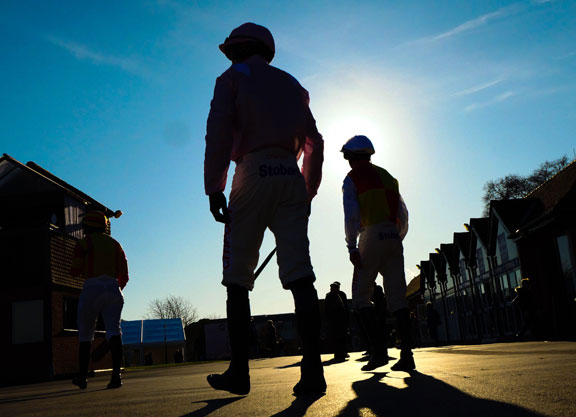Support has been pledged for jockeys to help mitigate the impact on their livelihoods from the coronavirus outbreak.
Racing in Britain is on hold until the end of April and jockeys at the lower end of the earnings scale are likely to soon feel the effects of being out of work.
Paul Struthers, Chief Executive of the Professional Jockeys Association, said, “I think the situation for jockeys is bleak, in the same way that it's bleak for racing and the same way it's bleak and worrying for the rest of the country and the entire world. The whole of racing is significantly affected. Jockeys, certainly in the very short term, are the most immediately affected, given that they are largely self-employed and their ability to earn any income, outside riding out, is immediately curtailed.
“One of, if not the only, benefit to suspending racing was that the sport could then focus on financially mitigating this suspension for the whole of the sport–jockeys being a big part of that. That work has started and will go on with great urgency. Packages of support will be made available, in addition to those packages of support the Government will make available to small business and to individuals.”
Jockeys' salaries vary significantly, and Struthers added, “I can't say what those packages look like yet, but what I can say–and say with certainty–is that support will be there. The median Flat jockey, after all their expenses, would earn less than £30,000 a year. As a salary for the general public this wouldn't sound too bad, but it is a salary for a 60-plus hour week. The median jump jockey would earn less than £20,000, so this will be of significant impact on jockeys.”
While British-based riders will be on the sidelines, their Irish counterparts–for the time being at least–are able to continue earning a living after Horse Racing Ireland confirmed its intention to continue racing behind closed doors.
Struthers admits this may prove a source of frustration for the PJA's members. He told Sky Sports Racing, “With racing in Ireland continuing behind closed doors, there will be questions, but there are significant differences. Ireland have taken, as a country, more aggressive containment steps than we perhaps took as a country–they are therefore behind us on the kind of timescale that we're facing in Britain.
“Even if we'd carried on behind closed doors–and practically we could have done, for five or six days, or maybe a week, it was going to get stopped. We were not going to be able to continue for any longer than that. If racing had continued behind closed doors, in the circumstances we face in this country–no more than two weeks [from] where Italy was, where the country is in lockdown–the reputational damage to racing, we might never have come back from.”
Struthers confirmed the biggest factor behind the British Horseracing Authority's decision to halt the sport was the projected pressure on medical resources.
He said, “We have tried to keep our members as up to speed as possible in a very fast-moving situation. We sent out a briefing to our members on Tuesday evening, trying to explain how difficult the decision [to cancel racing in Britain] has been.
“It was a decision the PJA supported, [but] with understandable reluctance–and it was based on, first and foremost, expert medical evidence, particularly around the imminent withdrawal of medical services and the call and demands on the NHS.
“Medics were concerned about the risks this would place on the health and safety of jockeys. It's far from uncommon that jockeys get injured during the course of racing and are transported to hospital via ambulance. While that ambulance service on racecourses is largely private, you've still got to get to A&E and be treated–and there was huge concern that we'd be putting those jockeys in harm's way. Our focus is on racing and making sure that when this ends, racing is in a position to resume quickly and racing is in a position to be strengthened to the future.”
Not a subscriber? Click here to sign up for the daily PDF or alerts.






